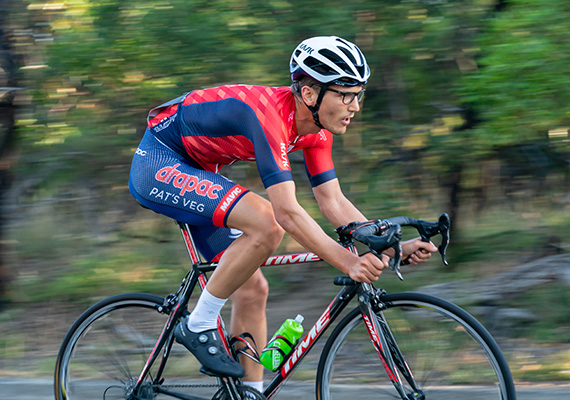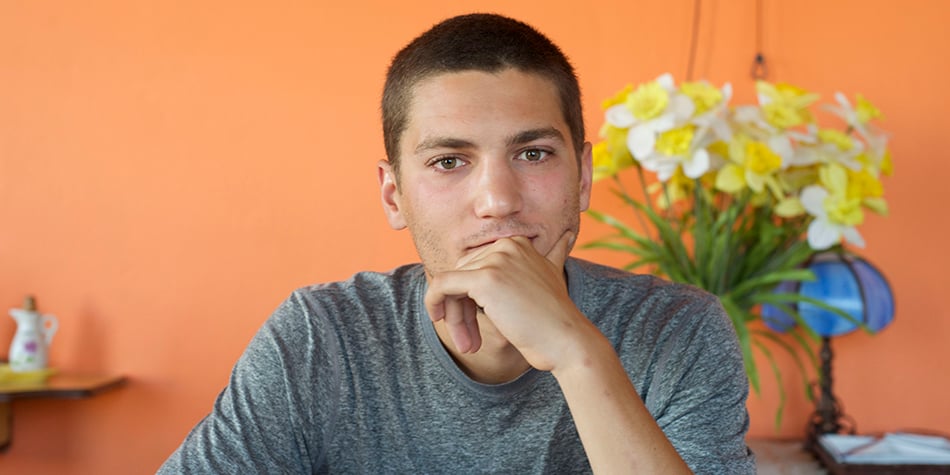When the late Dr Damion Drapac (BMBS ‘18 Deakin) received his medical degree from Deakin University in December 2018, it was the realisation of a decade-long dream.
A deep thinker, confident in himself and who he was, Damion’s capacity for kindness and compassion was not as intellectual as it was innate within him. He had an optimistic and generous nature, paired with a harmless sense of mischief. Damion knew in his heart that being a doctor, where he could give himself to others, was the best way he could achieve the best version of himself.
That dream was tragically cut short, less than a year after graduation, when Damion was killed in a road accident while cycling. In his memory, The Damion Drapac Centre was established, which will encourage other aspiring doctors with a vocation to make a positive impact on communities for generations to come.
Damion's father, Michael Drapac, recalls how driven his son was to achieve his goal, on his own terms.
When asked to describe his son, Michael refers to the saying, still waters run deep, and recalls a memory of when Damion was just two years of age. It was the final day of crèche for the year and Damion’s teacher says to Michael, 'Oh my gosh he speaks. He hasn’t spoken all year.' Michael reflects on this memory as a wonderful insight into the strength of mind that Damion had. And how this strength of mind grew and translated into his determination as an older man and the very deep thinker he was.
I knew how tenacious he was in wanting to be a doctor, and it was a ten-year journey. He was absolutely single-minded. I think the first thought when I heard he’d died was, "this boy, this dear boy, his work shouldn’t be forgotten".
Michael Drapac (centre)
Associate Professor Lara Fuller, who leads Deakin’s Rural Community Clinical School, saw Damion’s passion up close.
'I was fortunate to teach Damion when he was based in Daylesford during his year with us and got to know him then, and of course was really upset and impacted when he was tragically killed just shortly after graduating.'
Damion’s story reflects the individual paths that lead to a career in medicine. He initially studied nutrition sciences and attempted to enrol in medical school three times, before finally being accepted.
Michael Drapac wanted to honour his son’s journey and encourage other students with a strong vocation to pursue their goal of becoming a doctor. After discussions with Deakin University staff, including Associate Professor Fuller, Professor Gary Rogers, Dean of Medicine and members of the Advancement team, the centre’s foundations were established. It represents the largest single gift in Deakin University’s history.
Professor Gary Rogers, having entered medicine from an unconventional background himself, connected both personally and professionally with Michael’s desire to change the landscape of medical education.
'It’s really important to realise that, traditionally, doctors in Australia have come from a very narrow social spectrum. They’ve come from people largely of social advantage, from the suburbs of the central cities, and they haven’t had that breadth of diversity of the communities they’re coming to serve. The evidence is there to show that people who are from unconventional backgrounds are more likely to go into practice in both the specialty areas and the geographical areas where they’re needed.' Professor Rogers says.
'If we can recruit doctors from beyond the conventional pathway to medicine of the advantaged private school, if we can provide them with support and access, over time, we’re going to see a community of Drapac scholars who will go on to serve their communities and make a real difference in the world.'
These scholarships will help students overcome barriers and produce graduate doctors with the same enthusiasm to give back to their communities as Damion had. When I see the light shine in them and the many people in their communities that they will go on to serve, I will see my son.
Michael Drapac
The first two Drapac scholarships will be awarded in 2024, increasing to three new scholarships every year from 2026, with a total of 12 scholars across all four year levels of the medical program by 2030. These transformational scholarships, totalling $60,000 per student across the four years of their course, will be offered annually, in perpetuity.
The scholarships established in Damion’s honour will address structural issues that stop many committed and deserving students from pursuing a career in medicine, particularly those from disadvantaged, diverse and rural backgrounds. Beyond the essential financial boost the scholarships will provide, the centre will also have staff to support each student on their medical education journey.
Deakin Vice-Chancellor Professor Iain Martin says the University’s own research illustrates the growing challenge of recruiting doctors to work outside of metropolitan areas.
'You don’t need to look hard at the moment to see just how difficult it is to get doctors in regional and rural Australia,' Professor Martin says.
'We really want to use this gift to make sure that our medical program increasingly reflects the diverse communities that we draw from and serve – from the western suburbs of Melbourne right out to rural southwest Victoria.'
Supporting socially inclusive medical education
Damion's father, Michael Drapac, and Professor Gary Rogers, Dean of Deakin School of Medicine, explain why The Damion Drapac Centre and Scholarships are such an extraordinary opportunity for Deakin and the diverse communities we serve.

Aside from his drive to become a doctor, Damion’s love for cycling was well known among his peers – a passion he shared with his father, who ran a high-achieving pro cycling team for 15 years.
'There was a particular time when, right in the middle of a tutorial with me, Damion got this message from his dad to say, ‘Come over to the Tour de France,’ because the team was doing well,' Associate Professor Fuller recalls. 'So I let him go, and basically, he walked out of that tutorial and he got on the plane to France. It was one of those memorable moments and we gave him an award at the end of the year for having the best excuse ever to leave a tutorial.'
Michael Drapac hopes his seed funding will have a multiplier effect, with every student who graduates as a Drapac Scholar touching innumerable lives through their medical practice, the benefits rippling out through the communities they represent and serve.
With a scalable model, the sky is the limit for how far we can grow the fund and support the next generation of Australian medical graduates, drawn from diverse professional and personal backgrounds.
For Michael, it is heartening to imagine a future where there will be an ever-growing community of scholars, doctors and graduates who will continue Damion's legacy.
Interested in finding out more?
Deakin is honoured to partner with the Drapac family to advance socially inclusive medical education for generations to come. The Damion Drapac Centre for Equity in Health Education will enable and support access to medical training for students who feel passionately about medicine as a vocation but who may not qualify for conventional programs.

